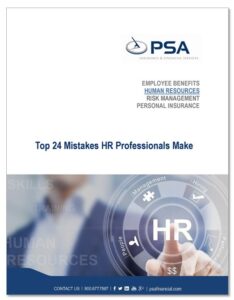Most everyone would agree Human Resources is an integral function of a high-functioning company. HR operations carry a lot of responsibility, mostly behind the scenes. From interviewing and hiring top talent to managing benefits and payroll, HR departments must keep track of countless forms, processes, regulations, and communications. Just one mistake — no matter how small — can cost companies talented employees, valuable time, and thousands of dollars.
The thing is, with so many complexities and new responsibilities – often without additional resources – many HR departments aren’t aware of the mistakes they’re making. For example, maybe you follow the same recruiting and hiring process you’ve always followed — without realizing that it’s outdated and doesn’t actually yield the best results. Or, perhaps you keep your files organized in a certain way, and you’ve never considered changing, even if a different system might be more efficient and compliant.
From the hiring process to employee development to terminations — and everything in between — there’s a lot of room for error.
When we work with clients to help them run more efficient HR operations, we take a hard look at their processes and identify areas where they can make improvements. From our years of experience in HR consultancy, we’ve identified an extensive list of the mistakes we see over and over again. These are just few of the top 24 HR departments can make:
1. Your HR Strategy Isn’t Connected to Your Business Strategy
No HR program should exist for its own sake. A performance management system, for instance, is only worthwhile if managers actually use it to help your workforce improve. All of your HR programs should serve a purpose within your company’s business strategy and, ultimately, improve your bottom line.
2. You Don’t Train Your Interviewers
Why is interview training necessary? First, you want your interviewers to know how to select the best candidates. Second, your interviewers must know and understand the constantly changing laws surrounding the process. Without ongoing education, you could find yourself in legal trouble.
3. You Don’t Have a Formal Compensation Structure
Do you have a formal structure that includes elements such as market data and internal and external equity analyses for how you compensate your workforce? Establishing a formal compensation structure can help ensure that you’re paying fair salaries and staying competitive as you look to hire new talent.
4. You Aren’t Tracking FLSA Issues
Recently proposed overtime rule changes under the Fair Labor Standards Act (FLSA) will impact the salary and compensation levels for exempt white collar workers if implemented. Make sure your HR department has properly classified each employee’s role and monitors FLSA developments and understands how it will affect your workforce.
5. Your Handbooks Are Incomplete or Out of Date
When issues come up, your HR department and managers need policies to reference — but those written policies are only as good as their last update. Employee handbooks are notorious for being out of date, making it hard for your employees to find the information they need. Make sure yours meets your workforce’s needs.





